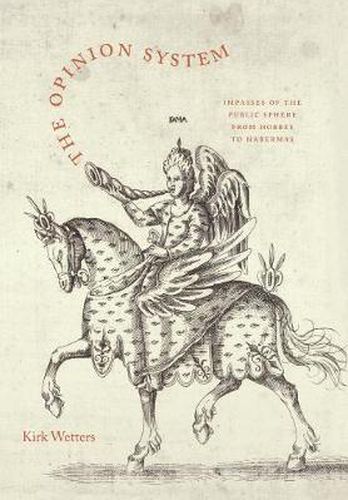Readings Newsletter
Become a Readings Member to make your shopping experience even easier.
Sign in or sign up for free!
You’re not far away from qualifying for FREE standard shipping within Australia
You’ve qualified for FREE standard shipping within Australia
The cart is loading…






This book revises the concept of the public sphere by examining opinion as a foundational concept of modernity. Indispensable to ideas like public opinion and freedom of opinion, opinion-though sometimes held in dubious repute-here assumes a central position in modern philosophy, literature, sociology, and political theory, while being the object of extremely contradictory valuations.
Kirk Wetters focuses on interpretative shifts begun in the Enlightenment and cemented by the French Revolution to restore the concept of opinion to a central role in our understanding of the political public sphere. Locke’s law of opinion, underwritten by the ancient conceptions of nomos and fama, proved to be inconsistent with the modern ideal of a rational political order. The contemporary dynamics of this problem have been worked out by Jurgen Habermas and Reinhart Koselleck: for Habermas the private law of opinion can be brought under the rational control of public discourse and procedural form, whereas Koselleck views modernity as the period in which irrational potentials were unleashed by a political-conceptual language that only intensified and accelerated the upheavals of history. Modernity risked making opinions into the idols of collective representations, sacrificing opinion to ideology and individualism to totalitarianism.
Drawing on an intriguing range of thinkers, some not widely known to American readers today, Kirk Wetters argues that this transformation, though irreversible, is resisted by literary language, which opposes the rigid formalism that compels individuals to identify with their opinions. Rather than forcing thought to bind itself to stable opinions, modern literary forms seek to suspend this moment of closure and representation, so that held opinions do not bring all deliberative processes to a standstill.
$9.00 standard shipping within Australia
FREE standard shipping within Australia for orders over $100.00
Express & International shipping calculated at checkout
This book revises the concept of the public sphere by examining opinion as a foundational concept of modernity. Indispensable to ideas like public opinion and freedom of opinion, opinion-though sometimes held in dubious repute-here assumes a central position in modern philosophy, literature, sociology, and political theory, while being the object of extremely contradictory valuations.
Kirk Wetters focuses on interpretative shifts begun in the Enlightenment and cemented by the French Revolution to restore the concept of opinion to a central role in our understanding of the political public sphere. Locke’s law of opinion, underwritten by the ancient conceptions of nomos and fama, proved to be inconsistent with the modern ideal of a rational political order. The contemporary dynamics of this problem have been worked out by Jurgen Habermas and Reinhart Koselleck: for Habermas the private law of opinion can be brought under the rational control of public discourse and procedural form, whereas Koselleck views modernity as the period in which irrational potentials were unleashed by a political-conceptual language that only intensified and accelerated the upheavals of history. Modernity risked making opinions into the idols of collective representations, sacrificing opinion to ideology and individualism to totalitarianism.
Drawing on an intriguing range of thinkers, some not widely known to American readers today, Kirk Wetters argues that this transformation, though irreversible, is resisted by literary language, which opposes the rigid formalism that compels individuals to identify with their opinions. Rather than forcing thought to bind itself to stable opinions, modern literary forms seek to suspend this moment of closure and representation, so that held opinions do not bring all deliberative processes to a standstill.